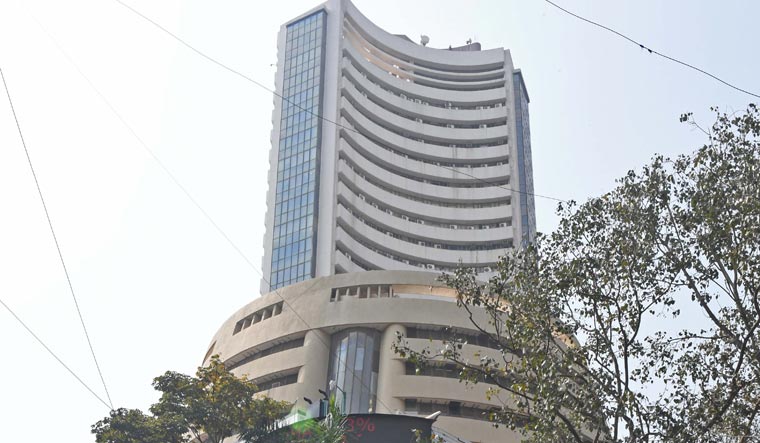Equity markets rose on Wednesday, with the BSE Sensex gaining over 1,100 points and the Nifty 50 gaining 450 points intraday as some value buying set in following Tuesday's crash. On Tuesday, the benchmark Sensex had crashed 4,389 points or 5.7 per cent as election results showed BJP was falling short of a clear majority and would now have to depend more on its NDA allies to form the government for a third time.
"The margin of safety in the valuation of key benchmarks was very low after the last 12-month retail liquidity-driven rally. This overvaluation of indices was already unsustainable, and the election results only acted as a trigger for them to correct," pointed Varun Lohchab, head of research - institutional equities, HDFC Securities.
He noted that the NDA forming government and delivering a pro-growth budget will soothe investors' nerves and help stabilise markets in the near-term.
"The NDA coming back to power for the third successive term is positive. However, a weak BJP mandate could be a hurdle for the party to carry out its aggressively robust vision," opined Anjali Verma, research analyst at Phillip Capital.
She noted that Prime Minister Narendra Modi's late evening address post NDA win had exude confidence of policy continuity and meeting manifesto outlook.
"As this plays out, trends will remain positive; otherwise, premium and expectations will have to be toned down across economic participants," said Verma.
The Narendra Modi-led government had for long focused on infrastructure-led growth.
Venugopal Garre of Bernstein felt some focus on subsidies at the expense of capital expenditure was likely, but he doesn't see any material impact in the near-term.
"We see volatility to remain a feature given uncertainty on policy path," he said.
Lohchab also believes that the NDA government will pursue a balanced economic growth model, which could mean equal emphasis on investment and consumption growth.
Not surprisingly, investors have lapped up shares of FMCG companies. After rising 6 per cent on Tuesday, Hindustan Unilever was up another 6.7 per cent on Wednesday. Other FMCG stocks also saw strong gains intra-day, with Emami surging 14 per cent, Jyothy Labs gaining 11 per cent, and Marico, Honasa Consumer and Hindustan Foods rising 8 per cent.
"Increased government spends will help accelerate rural revival and boost consumption. This will be beneficial for FMCG an retail (apparel, grocery) players," said Lohchab.
Shares of Heritage Foods, a company founded by N Chandrababu Naidu, surged near 18 per cent, after Naidu's Telugu Desam Party won a landslide victory in the Assembly elections in Andhra Pradesh.
Shares of liquor majors like United Spirits, Sula Vineyards and Radico Khaitan were also up sharply.
On the other hand, shares of state-owned companies that saw a strong rally over the past year are likely to be under pressure now, say analysts. On Wednesday, several PSU stocks were trading in the red. Cochin Shipyard, NBCC, Engineers India, Indian Bank, Power Grid, BPCL, NLC India, all declined between 2-6 per cent in intra-day trading.
Steep valuations and uncertain growth prospects will put pressure on PSU stocks, barring some of the large banks and utilities, said analysts.
Defence stocks were also under pressure, with Hindustan Aeronautics declining 3 per cent, Bharat Electronics down 2 per cent and Mishra Dhatu Nigam down 3.4 per cent.
"As government is expected to adopt a slightly more populist approach than earlier, expenditure on defence projects would be curtailed. It would result in derating of defence sector stocks as current steep prices have built in multiyear growth," felt Lohchab.
Ashutosh Tiwari, analyst at Equirus Securities feels rural recovery is going to be one of the strongest themes now, given that monsoon was expected to be good this year, income levels were improving and he also expects more social spending now.
"With mandate not very strong for NDA government during elections, more sops are likely to be given to rural India over next few years. Inflation has also moderated compared to last 2 years and hence rural recovery in form of staples as well as discretionary spending is likely to be the theme for next 2 years," he said.
After a decadal downturn, real estate sector has seen a strong revival over the last couple of years and the sector is looking good for the next 4-5 years, pointed Tiwari.
"Allied segments like building materials are likely to benefit from the real estate recovery and are set for structural growth over next few years," he said.
Power sector recovery will also continue but policy actions might become moderate and hence sector valuations should come down, he added.
"This is about decent economic growth but a peaking of earnings growth, less room for upward revisions and somewhat rich valuations. Hence, we retain our view of high single-digit returns, with the Nifty target unchanged at 23,500," said Bernstein's Garre.
How the government formation pans out and the influence of NDA partners in it, the policies it adopts and the extent of socialism that the government may now resort to and its fiscal impact, will be among the things to be watched out for, say analysts.



